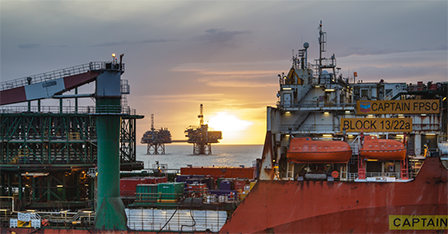
Increasing manning levels offshore is the “only way” the North Sea sector will be able to clear its growing maintenance backlog, according to oil and gas safety chiefs.
In March, as positive cases of coronavirus began to increase in the UK, operators moved towards a skeleton staff on offshore platforms in an effort to minimise the chance of an outbreak on board.
All but the most essential jobs were put on the backburner as the industry focussed on ensuring security of supply.
Manning levels fell to around 7,500 in April, down from an average of 12,500 pre-Covid, before rising to 9,500 where it has plateaued.
Trevor Stapleton, trade body Oil and Gas UK’s HSE director, acknowledged that it might not be possible to increase numbers offshore until Spring, but stressed there is a maintenance backlog which “needs to be addressed”.
Statistics published earlier this week by the Health and Safety Executive showed the number of hydrocarbon releases and non-compliance issues in the UK offshore oil industry increased by around 25% last year.
The findings sparked concerns from Unite union, with regional officer John Boland claiming the tradeoff between minimising Covid risks and carrying out maintenance work was putting the workforce at risk.
Speaking last week, Mr Stapleton said: “There is deferred maintenance in the UK sector – I’m not going to try and say there’s not.
“All the deferred maintenance is supported by an operational risk assessment and safety critical work isn’t postponed on a whim. It goes through a robust procedure – the regulator goes offshore and make sure things are in place and that they’re happy with how things are being managed.
“Nevertheless, it’s a backlog that needs to be addressed in the same way that project work does. It’s a balance between the health and safety of the workforce and making sure that major accidents hazard risks are addressed.
“With Covid it’s a difficult equilibrium to strike but that’s what we’re trying to look at and none of this is arbitrarily decided – it’s all covered by a robust risk assessment process.
“But, I acknowledge that this is building up and the only way we’re going to be able to reduce it is to increase persons on board levels. Maybe over the winter period that’s not going to be possible so it’s going to be make sure we get through the next few months and then start to look at the manning levels.”
Mr Stapleton also highlighted the need to for crew levels to increase in the early part of next year ahead of the planned Forties shutdown in summer 2021.
It was originally scheduled to take place in June this year, but Ineos took the decision to delay the work in light of the pandemic.
He added: “This will be particularly important when we have the major shutdown of the Forties pipeline. The focus needs to be on gearing up and making sure that we can get the manning levels to have a successful closure in the summer of next year.”

